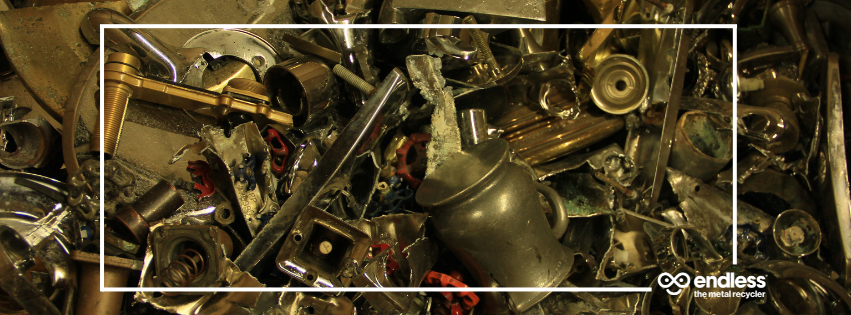When most people think of scrap metal, copper is the first material that comes to mind. It’s bright, valuable, and used in everything from pipes to electronics. But what many don’t realise is that brass scrap and bronze scrap are closely related to copper, and both can add serious value to your recycling pile.
At Endless, we’re here to show you where to find these materials, how they differ, and why recycling them together with your copper scrap is the smartest move for both your wallet and the planet.
What Is Brass Scrap?
Brass is a copper alloy, made by mixing copper with zinc. Its golden appearance makes it popular for decorative items and fittings, but it’s also strong and resistant to corrosion.
Common places you’ll find brass scrap include:
- Plumbing fixtures (taps, valves, pipe fittings)
- Musical instruments like trumpets or saxophones
- Decorative handles, knobs, and locks
- Radiators and heat exchangers
When these items wear out, they’re no longer just clutter, they’re brass scrap that can be recycled into new materials. Recycling brass helps recover its high copper content while reducing waste. Learn more about recycling copper here.
What Is Bronze Scrap?
Bronze is another copper alloy, but instead of zinc, it’s mainly mixed with tin (and sometimes small amounts of aluminium, nickel, or manganese). It has a darker, reddish-brown colour compared to brass.
You might find bronze scrap in places like:
- Bearings and bushings (used in industrial machinery)
- Statues and sculptures
- Boat fittings and marine hardware
- Musical instruments such as cymbals and bells
Because it’s hard, durable, and resistant to saltwater, bronze is common in marine and heavy industrial applications. That means both workshops and households may be sitting on bronze scrap without realising it.
How Brass and Bronze Relate to Copper
Both brass and bronze start with copper as the main ingredient. Copper gives them their conductivity, colour, and recyclability. The difference comes down to the other metals added:
- Brass = Copper + Zinc
- Bronze = Copper + Tin (and others)
That’s why all three (brass scrap, bronze scrap, and copper scrap) are valuable at a metal yard. Even when recycling brass or bronze, you’re essentially recycling copper content as well.
Scrap Prices: Brass, Bronze, and Copper
While we won’t go into exact figures (prices shift weekly with global markets), there are general rules worth knowing:
- Copper scrap usually fetches the highest return because it’s pure and highly sought after.
- Brass scrap holds solid value thanks to its high copper content, though it’s slightly lower than pure copper.
- Bronze scrap is similar, valuable due to its copper base, but market prices vary depending on alloy mix.
In other words, whether you’ve got copper pipes, brass taps, or bronze fittings, all three are worth collecting. And since copper scrap prices continue to be strong worldwide, any material with copper inside will bring a fair return.
Stay updated with our latest copper insights.
Where to Find These Materials
Looking to clear out your shed, workshop, or site? Here’s where to spot the hidden value in your belongings:
- Around the home: old taps, keys, locks, light fittings, and curtain rods often contain brass.
- In businesses/workshops: plumbing offcuts, machinery bearings, heat exchangers, and marine equipment often yield bronze and brass.
- Construction and demolition sites: pipes, wiring, radiators, and fittings can add up quickly.
- Hobbies and collections: broken instruments, statues, and ornaments made of brass or bronze can be scrapped instead of tossed.
If you’re unsure whether an item is brass, bronze, or copper, bring it in. Our team at Endless will grade it for you.
Need help identifying metals? Check out our guide to scrap metal grading.
Why Recycle with Endless?
Not all scrap yards are created equal. Endless stands out in Auckland for a few reasons:
- Top-rated service: Over 1,400+ Google reviews with a 4.9-star rating.
- Fair and transparent pricing: We stay competitive and make sure you understand what you’re paid for.
- Two convenient locations: Drop scrap at Onehunga or Wairau.
- Sustainability: We’re Toitū Carbon Reduce certified and proud members of ReMA (Recycling Management Association of NZ).
- Certified scales with immediate payment options for convenience.
Every piece of scrap we recycle feeds back into the circular economy, meaning less waste in landfill and more materials reused in industry.
Curious about how recycling works? Read our post on how metal is recycled.
FAQs About Brass, Bronze, and Copper Scrap
1. Can I recycle brass and bronze together with copper?
Yes. While we grade them separately for pricing, all three can be dropped off at Endless for recycling.
2. Are brass and bronze worth less than copper scrap?
Typically, yes, because they’re alloys. But both still hold strong value thanks to their copper base.
3. Do I need to separate brass scrap from other metals before bringing it in?
It helps. Clean, sorted scrap usually earns a better rate. But if you’re unsure, our team can separate it for you.
4. How does Endless set its scrap prices?
Our rates are tied to international market values for copper and related metals. That’s why prices for brass, bronze, and copper can shift daily.
5. Is recycling brass, bronze, and copper environmentally important?
Absolutely. Copper alloys are infinitely recyclable without losing quality. Recycling reduces the need for mining, saves energy, and lowers emissions.
In Conclusion:
Brass scrap, bronze scrap, and copper scrap all share the same story — copper at their core. By recycling them, you’re not just clearing space or earning extra cash, you’re contributing to a cleaner, more sustainable future.
Whether it’s brass fittings, bronze bearings, or copper wiring, Endless is here to help Auckland’s tradies, mechanics, and households turn scrap into value.
Ready to scrap? Visit us in Onehunga or Wairau, and find out how much your copper scrap price could be worth today.
